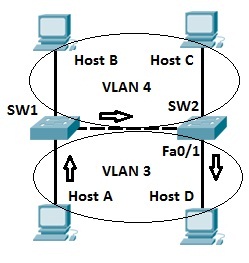IEEE 802.1Q is one of the Virtual Local Area Network (VLAN) tagging protocols supported by Cisco switches. This standard was created by the Institute of Electrical and Electronics Engineers (IEEE), so it is an open standard and can be used on non-Cisco switches.
The 802.1Q VLAN tags are inserted into the Ethernet frames’ header to identify traffic from multiple VLANs and untagged VLANs.
Original Frame:
802.1Q Frame:
802.1Q Tag Fields
802.1Q tag is a 32-bit (or 4-byte) field between the Source MAC address and the EtherType. It comprises two main fields, the Tag Protocol Identifier (TPID) field and the Tag Control Information (TCI) field.
Tag Protocol Identifier (TPID)
This 16-bit or 2-byte field is used to identify 802.1Q tagged frames from untagged frames.
Tag Control Information (TCI)
This 16-bit field contains the following sub-fields:
- Priority Code Point (PCP) – This 3-bit field can be used in prioritizing different traffic classes.
- Drop Eligible Indicator (DEI) – This 1-bit field can indicate frames that can be dropped in case of traffic congestion.
- VLAN Identifier (VID) – This 12-bit field specifies the VLAN to which the Ethernet frame belongs.
802.1Q Example
An example will attempt to clarify the concept. Let’s say we have a network of 2 switches and 4 hosts. Hosts A and D are in VLAN 2, while Hosts B and C are in VLAN 3.
On the segment between two switches, a process called VLAN trunking is used. Let’s say that host A sends a broadcast frame. SW1 “tags” the frame by inserting the VLAN ID in the header of the frame before sending the frame to SW2. SW2 receives the frame and sees the VLAN tag, so it knows the frame belongs to VLAN 3, so it sends it only to host D since that host is in VLAN 3.
Download our Free CCNA Study Guide PDF for complete notes on all the CCNA 200-301 exam topics in one book.
We recommend the Cisco CCNA Gold Bootcamp as your main CCNA training course. It’s the highest rated Cisco course online with an average rating of 4.8 from over 30,000 public reviews and is the gold standard in CCNA training:

